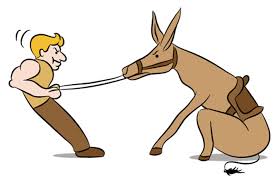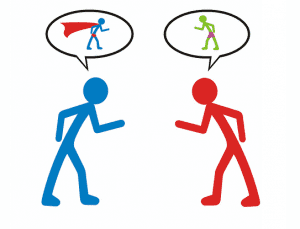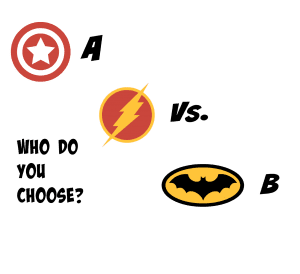 During a recent Flawed Situational Awareness program I conducted an exercise to show just how stubborn our brains can be. Without going into too much detail here, the exercise is designed to demonstrate the consequences of relationship biases. The results of the exercise are quite predictable and consistent. Whether we like it or not, our brain has some pre-programmed biases and the relationship bias can be very challenging to situational awareness.
During a recent Flawed Situational Awareness program I conducted an exercise to show just how stubborn our brains can be. Without going into too much detail here, the exercise is designed to demonstrate the consequences of relationship biases. The results of the exercise are quite predictable and consistent. Whether we like it or not, our brain has some pre-programmed biases and the relationship bias can be very challenging to situational awareness.
Relationship Bias
The premise behind the relationship bias is that we tend to be attracted toward (and like) people whom we know well and to whom we know share similar interests. The stronger our relationship with another person, the more likely we are to believe them when they tell us something. The weaker the relationship, the less likely we are to believe the other person.
Incident Scene Relationships
 Unfortunately, it can be very difficult to turn off the biases we have for (or against) someone simply because the two people happen to find themselves working together on an emergency scene. The relationships established previously – sometimes over years – spill over to the incident scene. If you like and respect the other person, you are far more likely to believe them when they share information with you. Conversely, if you don’t like or respect the other person, you may dismiss what they have to say.
Unfortunately, it can be very difficult to turn off the biases we have for (or against) someone simply because the two people happen to find themselves working together on an emergency scene. The relationships established previously – sometimes over years – spill over to the incident scene. If you like and respect the other person, you are far more likely to believe them when they share information with you. Conversely, if you don’t like or respect the other person, you may dismiss what they have to say.
Equally as challenging is working with people that we simply do not know very well. You don’t have a bias for or against them. However, it is difficult to blindly trust someone you don’t know very well. This is especially true if that person is sharing information that must be considered in your decision making.
A or B
 Occasionally, you may find yourself in a predicament where someone you favor (i.e., you know well and like) shares information with you that is in conflict with information being shared by someone you don’t favor (i.e., you don’t know very well or you don’t like). Let’s assume the information being shared in this example is critical to an important decision to be made.
Occasionally, you may find yourself in a predicament where someone you favor (i.e., you know well and like) shares information with you that is in conflict with information being shared by someone you don’t favor (i.e., you don’t know very well or you don’t like). Let’s assume the information being shared in this example is critical to an important decision to be made.
Because the information being shared is conflicting, the decision maker must choose between one or the other (Person A or Person B). Under rapidly changing conditions and time compression there may not be time to sort it all out. The relationship bias asserts the decision maker who will likely default and accept the information from the person who is well-known and well-liked over the one who is not. The problem is, the relationship may have little to do with the accuracy of the information.
The person who is well known and/or well liked can lead the decision maker astray with bad information (not on purpose, of course). Likewise, the decision maker can dismiss the accurate information being shared by the person who is not well known or well liked (again, not on purpose).
Dr. Gasaway’s Advice
 Biases can be very hard to overcome because many times we don’t realize we are being biased. Sometimes the best we can do is be aware of the potential for a bias to exist and then, consciously, work to overcome it or not be influenced by it.
Biases can be very hard to overcome because many times we don’t realize we are being biased. Sometimes the best we can do is be aware of the potential for a bias to exist and then, consciously, work to overcome it or not be influenced by it.
When faced with conflicting information from two people, you must decide which information you are going to believe. Ask yourself if you are favoring the information of one person over the other because you favor the person.
If time permits (and it doesn’t always) you can seek clarification from those providing the conflicting information. Sharing the information that is in conflict with each of them and allowing each of them to clarify or confirm their information may be enough to resolve the issue.
You can also (again, if time permits) ask someone else to confirm or refute the conflicting information. Passing this task to someone else assumes there is someone available to do that for you (knowing that sometimes there won’t be). If someone else is available, there is a chance they may not have the same relationship with others that you do and may not be gripped by the same relational biases.
You can also (once again, if time permits) search for additional information on your own that confirms or refutes the conflicting information. This may be as simple as assessing the incident scene with your own eyes or calling a third person on the radio and asking them for an assessment of conditions.
Action Items
 1. Discuss a time when you may have experienced a relationship bias and share how it impacted your decision making.
1. Discuss a time when you may have experienced a relationship bias and share how it impacted your decision making.
2. Discuss strategies for resolving conflicting information shared by two sources at an incident scene.
3. Discuss strategies for how to overcome the challenges that relationship biases can have on your decision making.
_____________________________________________________

If you are interested in taking your understanding of situational awareness and high-risk decision making to a higher level, check out the Situational Awareness Matters Online Academy.
CLICK HERE for details, enrollment options and pricing.
__________________________________
Share your comments on this article in the “Leave a Reply” box below. If you want to send me incident pictures, videos or have an idea you’d like me to research and write about, contact me. I really enjoy getting feedback and supportive messages from fellow first responders. It gives me the energy to work harder for you.
Thanks,

Email: Support@RichGasaway.com
Phone: 612-548-4424
SAMatters Online Academy
Facebook Fan Page: www.facebook.com/SAMatters
Twitter: @SAMatters
LinkedIn: Rich Gasaway
Instagram: sa_matters
YouTube: SAMattersTV
iTunes: SAMatters Radio
iHeart Radio: SAMatters Radio

I am really surprised at what an astonishing content you have here. This is definitely the work of a PRO. I must say, I’m really impressed at the amazing effort you have put in to make this write up a success.
Pingback: Memahami Sains Perilaku di Balik Jatuh Cinta • advislab